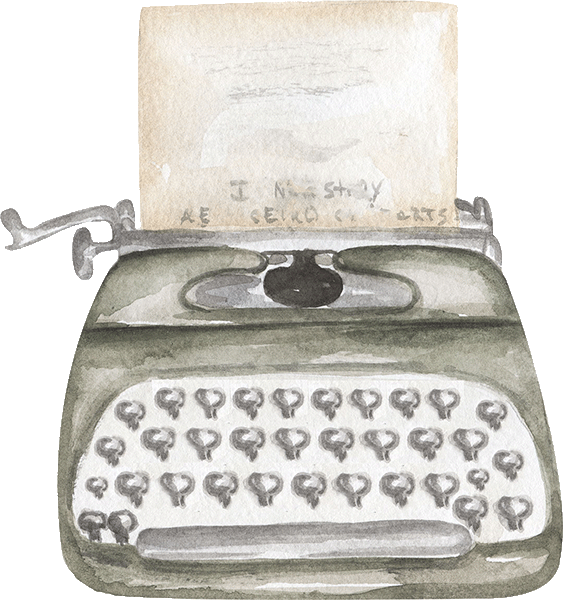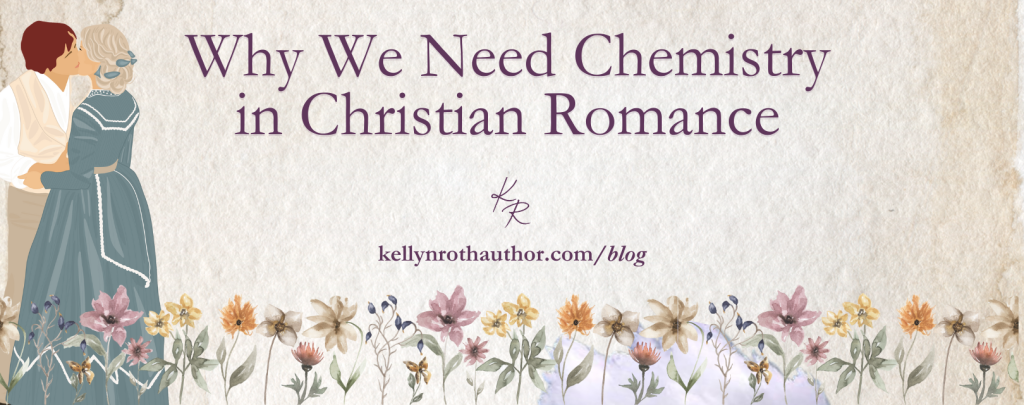Hey folks! I’m Kellyn Roth, and I’m here today with H.S. Kylian to talk about chemistry in romance. (If you don’t know, Hannah writes a bunch of cool serieses in the family saga arena, and you arguably can’t have a family without chemistry. More on that later.) This is the first in a series of romance-novel-writing posts to celebrate Valentine’s Day!
Today, we’re discussing how banishing chemistry in Christian romance (or treating it like smut/spice) is a mistake—and how it can be done well.
Hannah will also be weighing in on this topic, but I’m going to start off with an intro and some context for this discussion. Basically, Hannah and I are both fairly passionate about writing romance well—and further, at writing romance in a way that doesn’t make all Christian romance an arranged marriage between two people who decided they might as well further the human race, no other factors involved.
That is no fun. For anyone. And though I loved the arranged marriage and marriage of convenience tropes, part of the point of those tropes is watching two people fall in love. Which they indeed must, if they’re following God’s plan for marriage.
The point of this post is basically that chemistry in romance is good and necessary. But we’ll also get into how chemistry in romance is NOT the same as lust and sometimes is not even about physical attraction (though it can be).
What is Chemistry?
Chemistry is how their personalities work together—and it’s also a bit of attraction, a bit of “we work well together, don’t we?”
It is not how much they stare at each other’s lips or how muscular the guy is or how beautiful the heroine’s eyes are. Though these factors can influence chemistry, they are not chemistry itself.
Basically, with chemistry, you must convince the reader that these two people need to be together not just because they were trapped together in a coal mine but because God kind of had a plan for them to get hitched.
Hannah: I’d like to add that chemistry is this sort of sense, like a sixth sense if you will, lingering in the background as the relationship builds, helping to convince the readers that yes, these two knuckleheads should be together.
And, one of the ways that you can show a fictional couple has chemistry is in their first meeting. Right off the bat there should be some sort of zing! to the way they interact with each other. Think of Darcy & Lizzy in Pride & Prejudice or Eugene & Rapunzel in Tangled, for example.
Do Romances Need Chemistry?
Yes. In two ways, actually.
Chemistry is necessary in romance & marriage, but it’s also a good shorthand for a writer to use to show that the characters are at ease around each other, are attracted to each other, and feel safe being themselves around each other.
So a part of it can be tongue-in-cheek flirting, if that fits the characters, but it’s also how well they do together in different scenarios.
Hannah: When I read romance, I expect romance. I expect to be grinning like a sap and squealing with delight when Guy & Girl finally get together. I expect swooning over a manly man who protects his lady. In short, I expect to be shipping them hard, as in OTP hard.
If I’m reading a romance and I’m not shipping the characters, or if I’m shipping A and C with each other and they each end up with someone else, then something, at least to me, is wrong. There has to be a reason behind why these characters should be together, and if I can’t see that reason, then there’s no cheering when the couple finally gets together.
Is Chemistry Spice or Smut?
Is “chemistry” the same as “spice”? No, and I argue it’s not even the same as physical attraction in some ways.
Some of the best chemistry in the world is, to me, between Emma Woodhouse and Mr. Knightley in the book (and the movie—I’m thinking of the one with Gwyneth Paltrow), Emma. But they don’t even touch in the book, or mention physical characteristics of their romantic interest much at all, and in the movie, they’re pretty chaste, too. Like, you don’t see them gawking at each other, and there’s no random “man has to be repeatedly filmed while covered in water” portion in that particular movie.
Yet here we are, convinced (at least from my perspective) that this couple belongs together. And that has to do with their chemistry. They fit together. Their personalities jive. They both have something to offer each other.
I think this idea that chemistry = sex comes from the word itself. I mean, especially in the 1950s and 1960s, movies used “chemistry” as a way to refer to all those fun hormones that do drive sexual relationships.
This is obscure, but there’s a 1950s musical called “Guys and Dolls” which is … a wild ride … But it basically addressed purity culture from a pseudo-secular standpoint before there was purity culture or a “secular standpoint.”
But anyways, there’s a repeated emphasis on the term “chemistry” referring to sexual awakening (… I swear it’s so subtle in the musical) and specifically the verse from the song “If I Were a Bell”:
“Ask me how do I feel
From this chemistry lesson I’m learning;
Well sir, all I can say is
If I were a bridge I’d be burning!”
But again, this is not what we’re talking about here. We’re discussing chemistry as a writing term. As an aspect of romance. And there’s not a good, well-written romance that doesn’t include actual chemistry.
Because at the end of the day, romance is about marriage, and marriage is about the melding of two souls. If I read a book and think, “These characters are like water and oil!” then you have failed to give them proper chemistry. (Man, I feel so scientific.)
Is Chemistry Lust?
As far as physical attraction, we need to draw a sharp line in the sand here between physical attraction and lust.
Lust is selfish attraction that exists for the sole purpose of taking, owning, possessing, and generally leads to sin (and is a sin all on its lonesome). Whereas, physical attraction in and of itself can be controlled and between a committed couple is necessary.
I wrote a whole lot about this in my post “The Case for Physical Attraction in Romance,” but simply put, physical attraction is a blessing, not a curse, and not portraying it in our romances does a disservice to romantic relationships as a whole.
Hannah: I’d like to add that there could be a sort of Gnostic thinking to readers/authors not liking any physical attraction at all, which is just silly because Gnosticism isn’t Biblical. It’s rooted in the belief that all the physical is bad and only the spiritual is good, which is heresy, because…GOD CREATED THE PHYSICAL WORLD INCLUDING THE HUMAN BODY. The Book of Genesis clearly states, “And God saw all that He had made, and behold, it was very good.”
In conclusion, dear reader, we hold that chemistry is a necessary aspect in romance—and should not and must not be confused with sexual sins such as lust.
We need more healthy romances both in the Christian romance category and in general, and as we write those, we cannot ignore chemistry as a vital proponent of the relationship.
Do you enjoy writing or reading romance? What to you constitutes romantic chemistry?
Stay tuned for more posts on the writing of romance with Valentine’s Month from both of us!
TTFN!
~Kell~
Are you interested in getting to know me & my books better? Join my email list!



12 Responses
PREACH, GIRLS!!! ???? This was a fantastic start to this blog series! I’m so excited for what y’all share next!!!
Thank you! It was a ton of fun to write, and I’m so excited for the rest of our posts, too!
Speaking of the other posts, we need to finish the kissing one!
Indeed!
I LOVE THIS. (And yesss, the romance in Emma is SO underrated! *heart eyes*)
Thank you!!! (AND YES! I so agree!)
The Emma / Mr. Knightley example is a great one. They’re one of my favorites, too!
Yes! Absolutely. They’re such a sweet couple.
Kellyn…. this post was incredible! I’m a young writer who’s writing my first romance book right now, but I’ve realized lately how miswritten Christian romances tend to be! I’m about to go read all of the other posts you’ve written on the topic, but thank you SO much for bringing up a topic lots of people ignore — you’ve just provided me with extra motivation and encouragement to keep writing my book! <3
Oh, thank you, Shiloh! I so appreciate it, and I’m so glad this post was helpful to you!